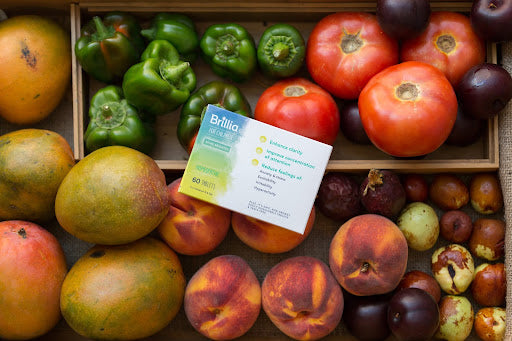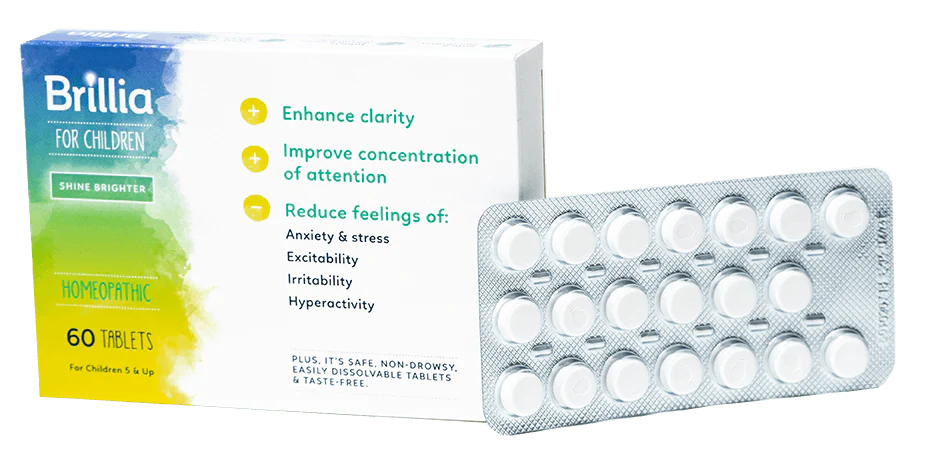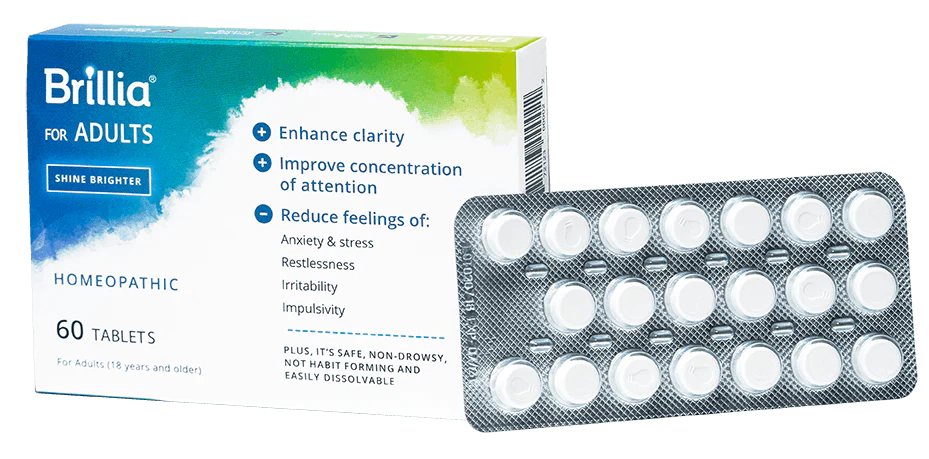Many people have found great success in taking prescription medication for ADHD, but some experts believe these drugs can also be overprescribed and misused. The rise of online diagnosing sites has contributed to this risk, with many of them offering a diagnosis and prescription in 20 minutes or less. Without taking the time necessary to properly diagnose a condition before prescribing drugs that may cause uncomfortable side effects and dependency, some doctors are putting their patients at risk in efforts to thrive in the increasingly competitive digital marketplace.1
At Brillia, we recognize that prescription medications have their place and respect the usefulness these drugs provide for the many users who rely on them to manage ADHD symptoms. However, we also think they are best used as a last resort after other methods of ADHD management have been exhausted. From healthy lifestyle habits to gentle homeopathic medications and supplements, there are a number of routes to reducing ADHD symptoms without the uncomfortable–and sometimes dangerous–side effects associated with prescription drugs.
Here is what you should know about homeopathy and ADHD:
Brillia
Brillia is a non-prescription homeopathic medication designed to reduce symptoms of ADHD and anxiety without harsh, synthetic chemicals or harmful side effects. Its active ingredient is Lapine S-100 immune globulin, an antibody to the brain-specific S-100 protein (S-100B), a key regulator of many different intracellular and extracellular brain processes. By regulating this protein’s activity, Brillia reduces inattention, restlessness, irritability, and hyperactivity at the source of symptoms without affecting any other systems in the body. As a result of the regulating effect of Brillia on the protein S-100, the level of monoamines (dopamine, norepinephrine, serotonin) in different parts of the brain normalizes, promoting clarity and a balanced mood. These monoamines are also modified by most stimulant ADHD drugs, though Brillia provides a more gentle and targeted process without any contraindications or risk of dependency. In fact, Brillia is so gentle it can be safely taken by adults and children. Clinical studies show that Brillia has a “pronounced and therapeutic effect” in patients with mild to moderate ADHD, especially when used in tandem with healthy lifestyle practices like proper nutrition, adequate sleep, controlled screen time, and mindfulness techniques as part of its holistic approach.2
There are also a number of supplements that can be beneficial alongside homeopathic medication like Brillia. However, it’s important to note that while supplements can be helpful, they are not regulated in the same way as a medication like Brillia. Though the FDA regulates the manufacturing practice of supplements, they do not require that manufacturers provide any research reports or production reviews. Brillia, as a homeopathic medication, is required to provide substantive documentation, clinical trials, and studies of the claims the product makes in addition to abiding by stringent FDA standards and regulations. In order to be sold in the U.S., Brillia has gone through a proper registration process detailing active ingredients and inactive ingredients to prove safety and efficacy.
Find out the benefits and drawbacks of incorporating the following supplements into your routine to manage ADHD.
Zinc
Studies show that many children with ADHD have lower levels of zinc in relation to children without ADHD.3 For this reason, some experts have recommended using zinc to reduce impulsivity and hyperactivity, though there is not enough data to show its positive effects on inattention. One study showed that taking zinc with a psychostimulant caused a nearly 40 percent reduction in the amount of the stimulant required to function at optimal levels, which can be useful for those who wish to stay on their prescription medication.4 However, before supplementing with zinc, it’s recommended to check your zinc levels first because high levels of zinc can cause dangerous side effects.5
Vitamin B-6 and other B Vitamins
Considered an “essential nutrient,” vitamin B-6 plays an important role in brain development and in keeping the nervous system and immune system healthy.6 Some studies show that the vitamin can also help reduce hyperactivity and inattention.7 Other B vitamins have also proven to be useful; one study showed that women who don’t get enough folate, a type of B vitamin, during pregnancy are at higher risk of giving birth to children with hyperactivity disorders.8 Though vitamin B-6 has a high safety profile, the Mayo Clinic suggests using food sources over supplements because too much of the vitamin can cause coordination problems, heartburn, and skin lesions.9 Vitamin B-6 food sources include poultry, fish, potatoes, chickpeas, bananas, and fortified cereals.
Shine Brighter
Magnesium
Magnesium has been shown to have a calming effect on users with hyperactivity and agitation, though it is not known to improve attention. Only when combined with vitamin B-6, may the mineral have positive effects on inattention and may even lessen aggression in users.10 Despite these positive effects, users should be aware of the source of their magnesium supplement. If sourced from the sea, like the popular magnesium product CALM, the supplement may contain trace amounts of arsenic and the chemical toxins cadmium and lead.
Though the medication Brillia also contains magnesium, its magnesium content is pharmaceutical grade and not sourced from the sea.
L-Carnitine
A chemical that assists the body in turning fat into energy, L-carnitine may also help reduce symptoms associated with ADHD, though research findings are mixed. One study indicated that 54 percent of a group of boys with ADHD showed improvement in their behavior when taking L-carnitine, though researchers concluded more data was needed.11 Another study found that L-carnitine was useful in reducing irritability in users taking a prescription stimulant for ADHD, though researchers did not support the application of L-carnitine as an adjunctive therapy at the end of the study.12 L-carnitine has also not been suitably studied for safety in children, so it’s advised to talk to one’s doctor before giving the supplement to a child.
Avoid Food Coloring, Preservatives, and Potential Allergens
Some homeopathic supplements may contain food coloring, preservatives, and potential allergens to watch out for. This is especially true for those with ADHD because of the effect certain chemicals have on ADHD symptoms. For instance, red dye 40 has been linked to hyperactivity and it may also cause other neurobehavioral effects.13 Some studies show that artificial coloring and flavors, as well as the preservative sodium benzoate, can even lead to hyperactivity in people without ADHD.14
Brillia does not contain artificial colors or artificial flavors and it is nut-free and gluten-free. However, the medication does contain lactose, which may be an issue for those who cannot tolerate lactose enzymes. Lactose intolerance is not the same as a milk or dairy allergy. In fact, some parents are using a lactose enzyme to control reactions, like gas or stomach issues. The severity depends on the degree of sensitivity. You can always try Brillia to see if there are any undesirable reactions, and if so, we offer refunds for first-time buyers.
Consider Therapy
Another gentle approach to managing symptoms of ADHD without resorting to prescription medication or supplements is therapy. Studies show that cognitive behavioral therapy (CBT), a type of therapy that helps identify and change underlying thought patterns, has been shown to improve symptoms of ADHD and even comorbid anxiety.15 Therapists can help patients come up with tools to reduce symptoms and offer advice on how to thrive at work and at home.
No two people experience ADHD in the same way, so finding out what works best for you is always a smart approach. From homeopathic medication to therapy and beyond, there are so many routes available to make living with ADHD more manageable.
Find out more about how Brillia works and explore more resources on ADHD at the Brillia(nce) Resource Center.
Get a whole bunch of support right in your inbox.







